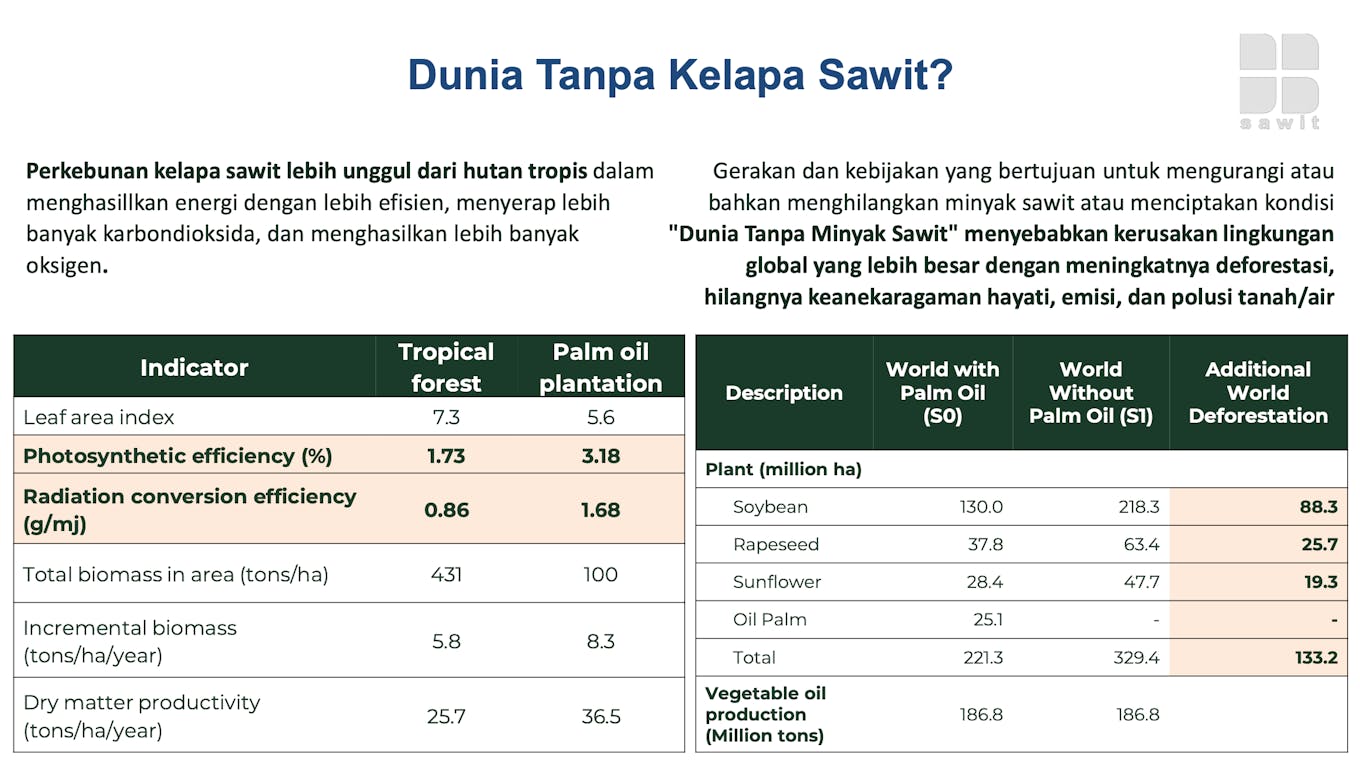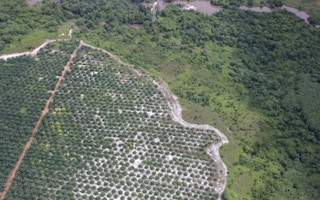Palm oil plantations are better at absorbing carbon than tropical forests, an executive for the Indonesian government’s palm oil agency claimed on Tuesday (1 August), despite scientific evidence that proves the opposite.
To continue reading, subscribe to Eco‑Business.
There's something for everyone. We offer a range of subscription plans.
- Access our stories and receive our Insights Weekly newsletter with the free EB Member plan.
- Unlock unlimited access to our content and archive with EB Circle.
- Publish your content with EB Premium.
Speaking at the launch of a new programme to help smallholder farmers grow crops without cutting trees, Achmad Maulizal, head of corporate affairs for Indonesia’s Palm Oil Fund Management Agency (BPDPKS), also argued that palm oil trees are also more efficient than tropical forests at producing energy and release more oxygen into the atmosphere.
“Oil palm plantations are superior to tropical forests in producing energy more efficiently, absorbing more carbon dioxide and producing more oxygen,” according to his presentation in Jakarta, which was shared with Eco-Business.
A slide titled ‘World without palm oil?’ said that policies that disadvantage palm oil are “causing greater environmental damage with increased deforestation, biodiversity loss, emissions, and soil and water pollution,” because of the crop’s higher productivity per hectare compared to other edible oils such as soy, sunflower and rapeseed.”

A slide presented by the Indonesian government’s palm oil agency, which claims that palm oil plantations are better at absorbing carbon than tropical forests [click to enlarge]. The slide is titled “A World Without Palm Oil?” in Bahasa Indonesia. Image: supplied
Maulizal’s comments come as the Indonesian government locks horns with the European Union over a new deforestation law that makes forest-risk commodities such as oil palm trickier for Indonesia to export.
Indonesia, the world’s largest oil palm producer, has decried the EU Deforestation Regulation (EUDR) as discriminatory, particularly against smallholder farmers that produce roughly 40 per cent of the country’s crop, and ignores the progress the industry has made to reduce palm oil-linked deforestation.
“Criminally misleading”
Experts have denounced the claims about the climate benefits of palm oil plantations over natural forests, an estimated 3 million hectares of which have been cleared to grow palm oil in Indonesia over the past two decades.
Professor William Laurance, an expert in land use, tropical forests and habitat fragmentation at James Cook University, said that oil palm plantations are not better at storing carbon than tropical forests. He dismissed the claim as “goofy”.
Carbon storage in rainforests can exceed 400 metric tonnes per hectare, not including the roots and belowground soil carbon, and even a mature oil palm plantation would lock in just a fraction of that – typically between 2-10 times less, he told Eco-Business.
Laurance noted that a key point made by the palm oil lobbyist is that a growing oil palm plantation will absorb more carbon on a daily basis than a mature rainforest. But this is only true when the original forest has been felled and converted to oil palm – producing massive carbon emissions in the process.
He said that the claim about the oxygen-releasing potential of oil palm plantations is a “red herring” and therefore misleading, since there is an abundance of oxygen in the atmosphere. “There is much more [oxygen] than we’d ever need, unless we go to high elevations where the entire atmosphere gets thinner,” he said.
Kiki Taufik, global head of the Indonesian forests campaign for environmental group Greenpeace, commented: “Setting aside the critical importance of tropical forests for biodiversity, the implication that clearing forests for palm oil will somehow absorb more carbon than leaving them intact, is criminally misleading.”
Taufik pointed to a 2018 study in the science journal Nature that found that 174 tonnes of carbon is lost per hectare of rainforest converted to plantation.
Familiar tactics
Indonesian palm oil lobbyists have deployed disinformation campaigns before. In 2007, government and business executives were found to be distributing pamphlets that misrepresented the climate benefits of palm oil plantations.
An article on environmental news website Mongabay that covered the campaign pointed to several studies that show that oil palm plantations produce more greenhouse gas emissions than tropical forests – and even more when the emissions of fertiliser and oil palm processing are considered.
Maulizal’s presentation comes a few days before the first meeting of the Indonesia-Malaysia-European Union Task Force, which was set up in June to address concerns over the implementation of the EUDR. Palm oil industry supporters say the regulation will marginalise smallholders unable to comply with stringent new rules.
Maulizal was talking at the launch of the Farmers For Forest Protection Foundation (4F), which was set up by Indonesia’s palm oil smallholders union (SPKS) to help smallholders comply with the EUDR. 4F aims to manage funding, support forest conservation and deforestation-free practices for small farmers and local communities.

















